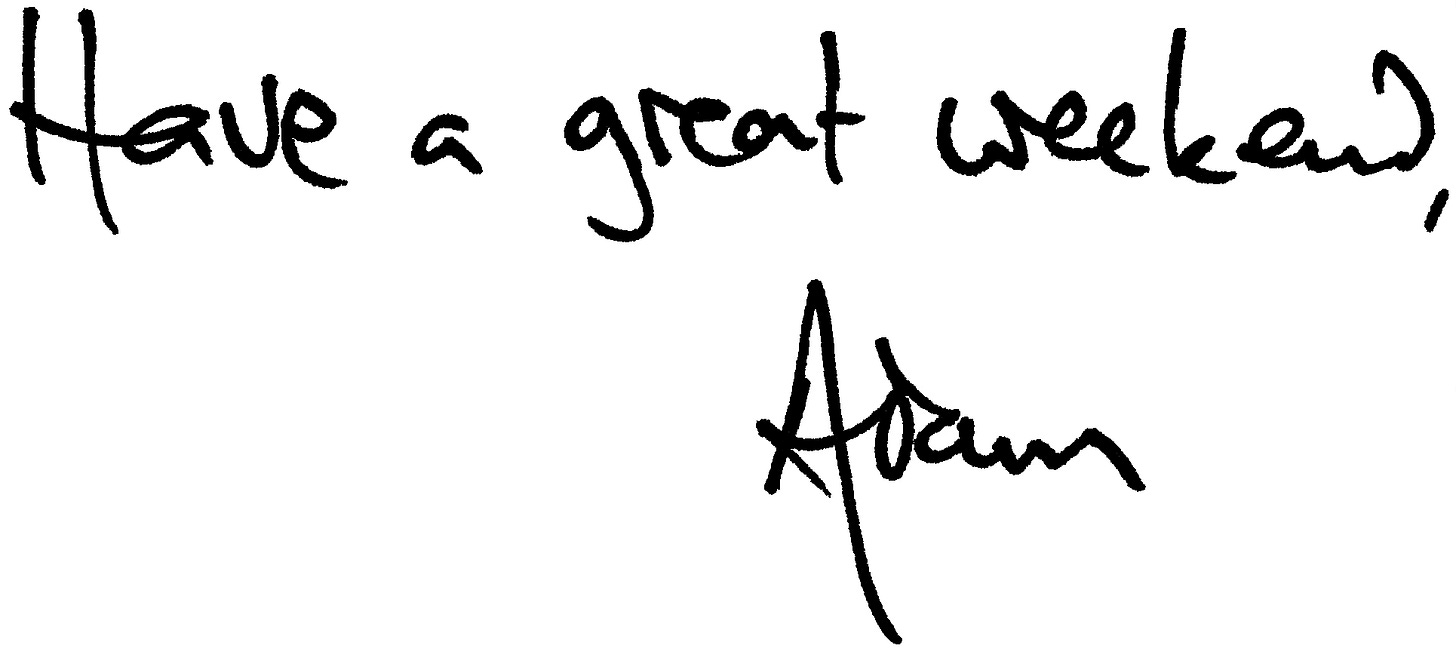Seven Core Ideas for Great Working Lives (and here's the first one)
And here's the first one
As I began researching and writing about the ideas in this newsletter and the book behind it, I realized that they fit together coherently because they all stem from seven core, interconnected principles.
(Thank goodness it turned out to be seven! As everyone knows, it’s a rule of the universe that all frameworks need seven elements: the seven deadly sins, the seven colors of the rainbow, the seven wonders of the world …)
These seven core principles define what this Great Work project’s all about. And they’re helpful in themselves, for those of us looking for serenity and success in work that we care about.
Until now, I haven’t written much about them.
So, over coming newsletters, I’m going to write a bit about each of these core principles, and why they matter.
This first one is the foundation for all the others.
Principle 1: work’s a huge part of life. It should be part of what makes life fulfilling and fun.
You may spend around 100,000 hours working. That’s about a fifth of your waking life. To aim merely for a good work-life balance—as if work’s a necessary evil, a price that has to be paid for the good things in life—is a dismal approach. Your work should be more than an instrumental good (done to earn you money): it should be something that’s intrinsically good in your life.
Of course not every working moment will be one of exuberant joy. Sometimes it’s going to be a grind. There’ll be stressful moments, especially if you care about what you do. There’ll be days when you’d rather not work. But, overall, your work should be one of the things you’d want to talk about were someone to ask you what the good things are in your life right now.
So if that’s not how it is, think deeply. What needs to change? How could you make those changes? What’s the first step? The remaining six core principles are about answering those questions.
The mixed blessing of caring about your work
Those of us who do work we care about—work that may make a difference—have a mixed blessing.1 Our work may give meaning to our lives, and allow us, when we’re old, to look back upon a working life well-spent. Knowing you’re doing good gives you some protection against exhaustion. But research indicates that caring about your work makes you more vulnerable.2 We put more into our work, at greater personal cost. Many forego substantially higher earnings to do work that matters to them.3 You may put up with working conditions that, were you less invested, you wouldn’t tolerate. You’re more likely to show up for work when you’re sick.4 Work calling for compassion can be mentally taxing.5 It hurts when things go wrong. And as the artist Adam J. Kurtz puts it (and this is my all-time favorite work-related quote):
Do what you love and you’ll
never work a day in your lifework super fucking hard all the time with no separation or any boundaries and also take everything extremely personally.
I’ve written before about what makes work good:
People tend to see their work as a job, a career, or a calling—and only one of those. If it’s a job, you’re doing it for the wages. If it’s a career, it’s for the income but also status and esteem—things most of us value, even if we’d like to believe otherwise. If it’s a calling, a vocation, you’re doing it for personal fulfillment, and it’s likely to be work that matters to the world.
The more you see your work as a calling, the more satisfied you probably are with your life and your job, and the more meaning you are likely to find in your work.
And work should also be fun, at least some of the time. This is the thesis of a wonderful new book that I’ll be writing more about in future emails, Bree Groff’s, Today Was Fun: A Book About Work (Seriously) (Page Two, 2025). She’s right.
Do something about it
So this principle is a plea that, if work’s not one of the good things in our lives, we figure out why that is and then do something sensible about it.
Sometimes that’ll involve a deep inward gaze to figure out how you might approach your working life better. This is what an earlier article, Know Thy Working Self, was about. And then, of course, you’d need to figure out the new approach. Often, it’s the reaction, not the stuff. Maybe it’s just taking a break to allow yourself to step back and recognize all the good things about your working life.
And sometimes it’s about recognizing that something external needs to change. One of my most popular articles here (and there’s a message in that popularity) was about knowing what you want to do, and what you really don’t. Another was about saying no well. And my last newsletter was about when to leave a job because it’s wrong for you (and when not to).
Have high expectations. Your work should be one of the good things in your life. Especially if you’re someone who’s chosen work you care about. Our years are subject to a no-returns policy. And a fifth of your waking hours is a lot of hours. Figure out what you can do to cultivate a working life that’s good, and then get going. And core principles two to seven do exactly that.
New here? Or have you, through some terrible oversight, not joined this community of people who do tough work that matters? Sign up! It’s free, bullshit-free, and not selling anything.
And, if you found anything helpful here, please do share it with others who might find it useful too. Thank you!
Baoguo Xie et al., “Linking Calling to Work Engagement and Subjective Career Success: The Perspective of Career Construction Theory,” Journal of Vocational Behavior 94 (June 2016): 70–78, https://doi.org/10.1016/j.jvb.2016.02.011; Ryan D. Duffy et al., “Perceiving a Calling, Living a Calling, and Job Satisfaction: Testing a Moderated, Multiple Mediator Model,” Journal of Counseling Psychology (US) 59 (2012): 50–59, https://doi.org/10.1037/a0026129; Anna Praskova et al., “Self-Regulatory Processes Mediating Between Career Calling and Perceived Employability and Life Satisfaction in Emerging Adults,” Journal of Career Development 42, no. 2 (2015): 86–101, https://doi.org/10.1177/0894845314541517; Andreas Hirschi and Anne Herrmann, “Vocational Identity Achievement as a Mediator of Presence of Calling and Life Satisfaction,” Journal of Career Assessment 20, no. 3 (2012): 309–21, https://doi.org/10.1177/1069072711436158; Adam M. Grant and Elizabeth M. Campbell, “Doing Good, Doing Harm, Being Well and Burning out: The Interactions of Perceived Prosocial and Antisocial Impact in Service Work,” Journal of Occupational and Organizational Psychology 80, no. 4 (2007): 665–91, https://doi.org/10.1348/096317906X169553; Adam M. Grant and Sabine Sonnentag, “Doing Good Buffers against Feeling Bad: Prosocial Impact Compensates for Negative Task and Self-Evaluations,” Organizational Behavior and Human Decision Processes 111, no. 1 (2010): 13–22, https://doi.org/10.1016/j.obhdp.2009.07.003.
Wilson and Britt, “Living to Work”; Praskova et al., “Self-Regulatory Processes Mediating Between Career Calling and Perceived Employability and Life Satisfaction in Emerging Adults.”
Robert H. Frank, “What Price the Moral High Ground?,” Southern Economic Journal 63, no. 1 (1996): 1–17, https://doi.org/10.2307/1061299.
Gunnar Aronsson et al., “Sick but yet at Work. An Empirical Study of Sickness Presenteeism,” Research Report, Journal of Epidemiology & Community Health 54, no. 7 (2000): 502–9, https://doi.org/10.1136/jech.54.7.502.
Julian A. Scheffer et al., “Caring Is Costly: People Avoid the Cognitive Work of Compassion,” Journal of Experimental Psychology: General (US) 151, no. 1 (2022): 172–96, https://doi.org/10.1037/xge0001073.






More brilliant and positively engaging content sir! Love it!!